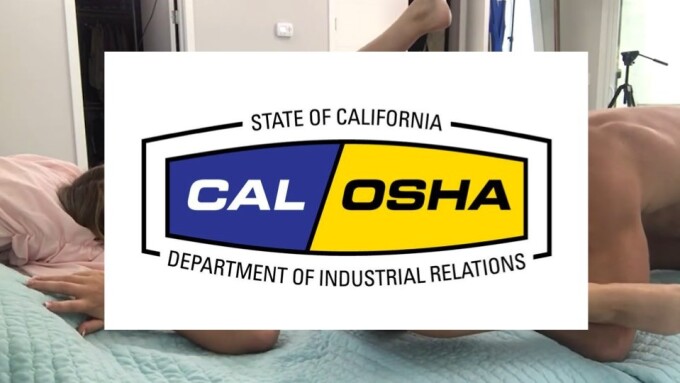SAN DIEGO — The California Occupational Safety and Health Standards Board (Cal/OSHA) “voted unanimously today to create an advisory committee because of workplace concerns,” reported Alana Evans, President of the Adult Performers Actors Guild (APAG), who attended the meeting.
The meeting was scheduled for this morning after Cal/OSHA issued a Board staff evaluation on October 2 recommending that an advisory committee be convened to consider the following items:
- When and how employers could be required to pay for testing via Free Speech Coalition's PASS system
- Require and expand the testing to other types of tests for infections that are not detected in the blood, including swabbing appropriate areas for sexually transmittable infections
- Require the Free Speech Coalition to report production moratoriums to the Division of Occupational Safety and Health
- Require the testing labs in the PASS system to be certified by Centers for Medicare & Medicaid Services (CMS) through the Clinical Laboratory Improvement Amendments (CLIA)
- Require employers to educate employees about HIV preexposure prophylaxis (PrEP) and offer it in addition to requiring condom use
The Cal/OSHA recommendations stem from an original petition drafted by former performer Verta, who retired some time ago after three and half years in the industry, including a stint as secretary for the Adult Performer Advocacy Committee (APAC) and an advisory role at the Free Speech Coalition (FSC).
The new recommendations could mean unprecedented government oversight over adult sets in California.
“We are disappointed that the committee has voted unanimously to create an advisory committee due to the concerns of workplace violence,” APAG’s Evans told XBIZ. “The union already has fail-safes in place to protect performers, including our performer consent list. We hope that the committee will recognize the efforts that members of our industry go to in an effort to protect talent. The union will continue to work with other members of the industry to tackle this latest attack against our industry.”
Over the last few days, Evans and APAG have spearheaded an effort through social media and personal calls to raise awareness of the possible consequences of today’s meeting.
"We had hoped to have the petition rejected as our industry is already implementing its requests," added the FSC's Ian O'Brien, who also traveled to San Diego for the Cal/OSHA meeting today. "But we are looking forward to continuing to work to ensure the health and safety of our performers."
APAC Chairperson Riley Reyes told XBIZ that though they "are disappointed in this outcome, APAC welcomes the opportunity to make official the health practices our industry has long maintained with such success. So long as the performers, who are the primary stakeholders in this issue, are consulted and involved in the process, we are confident that this can be a positive step for our industry."
"Nothing about us without us," Reyes added.
XBIZ spoke exclusively with Verta, who submitted the original petition months ago. The former performer was unaware of the decision the board had taken today and expressed shock and frustration at both the lack of communication from Cal/OSHA and the lack of open support from performers and advocacy organizations when she brought up the labor issues that she included in her proposal.
Frustrated by what she saw as the non-involvement of adult talent, some of them very prominent, Verta took the unusual step of screencapturing tweets from a large number of top-tier performers complaining about work conditions and attached them to her proposal.
Since the committee today emphasized their concern about “violence” on sets, it seems that those attached tweets from top talent might have had a influence on OSHA’s decision to move forward.
Verta’s proposal mostly included suggestions about workplace standards but some were puzzled about the inclusion of the line “as hiring practices based on race are illegal, and racial discrimination is protected against under laws such as Equal Employment Opportunity and Title VII of the Civil Rights Act, despite how individual scenes might be marketed, 'interracial' may no longer be viewed as a sex act.”
“I didn’t actually attend the OSHA meeting,” Verta told XBIZ. She seemed surprised by our request for comment.
“To be fair,” she said, “I sent it to APAC and APAG and a few people at the FSC, and only one performer got back to me — she can come out if she chooses to. I told several people that I intended to do it. And nobody cared.”
“I’m not even in the industry anymore, I even changed my name,” she added.
“This is all so annoying to me! I have been going to OSHA meetings, and I was the only person showing up and I told [OSHA], when people finally decide to come, please listen to performers and to what performers have to say.”
“I’m very adamant about [OSHA] talking to performers, but I can’t be trying to make people care. I told people that I was doing this, and nobody cared until now, [when] I’m trying to move on with my life. This is irritating to me! I begged them to get involved, now that OSHA was ready to listen. I was very pushy about it, and nobody cared.”
As for the petition, Verta said she “was just trying to do what I thought people wanted.”
“I was [in the] industry for three-and-a-half years, I was the secretary of APAC for a year. I was on the advisory board for the Cal/OSHA submission that the FSC submitted,” she explains. “So people in the industry knew that I was doing it. For people to act that this was just sprung on them, this is remarkably irritating but not remotely surprising.”
XBIZ will update this article as more information becomes available.









